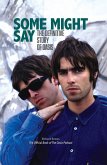The Britpop era was marked by a sense of optimism and a rejection of the grunge movement that had dominated the early 1990s. While grunge was introspective and often melancholic, Britpop was outward-looking, celebratory, and distinctly British. The music was often characterized by jangly guitars, catchy hooks, and lyrics that referenced British life and culture. Bands like Oasis, Blur, Pulp, and Suede became household names, and their music became the soundtrack to a generation.
Britpop was also closely associated with the cultural and political climate of the time. The early 1990s were a period of economic recovery in the UK, following the recession of the late 1980s. There was a renewed sense of national pride, and Britpop became a symbol of this renewed confidence. The movement coincided with the rise of "Cool Britannia," a period of cultural renaissance in the UK, and the election of Tony Blair's Labour government in 1997, which promised a new era of prosperity and progress.
However, Britpop was not without its critics. Some saw it as a superficial and commercially driven movement, lacking the depth and innovation of previous musical eras. Others criticized its focus on British identity, arguing that it was exclusionary and nationalistic. Despite these criticisms, there is no denying the impact of Britpop on British culture and its lasting legacy in the music industry.
As we explore the origins, key figures, and cultural significance of Britpop, it is important to understand the broader context in which it emerged. Britpop was not just about the music; it was a reflection of the social, political, and cultural changes taking place in the UK at the time. It was a movement that captured the spirit of a generation and left an indelible mark on British culture.
Dieser Download kann aus rechtlichen Gründen nur mit Rechnungsadresse in A, B, CY, CZ, D, DK, EW, E, FIN, F, GR, H, IRL, I, LT, L, LR, M, NL, PL, P, R, S, SLO, SK ausgeliefert werden.









